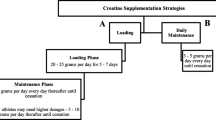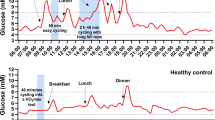Summary
Seven trained men were studied during graded cycle ergometer exercise to assess the effects of caffeine ingestion on metabolism and performance. A single blind experimental procedure was followed with one trial being performed 60 min after the subject ingested caffeine (5 mg·kg−1) while the second trial required the subject to ingest a placebo with the treatment order being counterbalanced. Subjects began exercising at a work load of 30 W while the load was increased by an additional 30 W every 3 min until the subject could not maintain the desired pedal frequency. Venous blood samples were obtained at each work load and assayed for free fatty acids (FFA), glycerol, lactic acid, and caffeine. There was no significant difference (p>0.05) in time to exhaustion between the two experimental treatments. Resting measurements of FFA and glycerol showed that ingestion of caffeine brought about significant (p<0.05) increases in plasma levels of both FFA and glycerol compared to values obtained during the placebo treatment. The rate of blood lactic acid accumulation was not significantly different (p>0.05) between the two exercise tests. These data suggest that a small dose of caffeine does not change the rate of blood lactate accumulation nor does it enhance performance during graded cycle ergometer exercise.
Similar content being viewed by others
References
Adams RP, Welch HG (1980) Oxygen uptake, acid-base status, and performance with varied inspired oxygen fractions. J Appl Physiol 49: 863–868
Bergmeyer HV (1974) Methods of enzymatic analysis. Academic Press, New York, pp 1404–1408
Costill DL, Dalsky GP, Fink WJ (1978) Effects of caffeine ingestion on metabolism and exercise performance. Med Sci Sports 10: 155–158
Ganslen RV, Balke B, Nagle F, Phillips E (1974) Effects of some tranquilizing, analeptic and vasodilating drugs on physical work capacity and orthostatic tolerance. Aerospace Med 35: 630–633
Harper HA, Rodwell VW, Mayes PA (1977) Review of physiological chemistry. Lange Medical Publ., Los Altos, pp 280–305
Havel RJ (1965) Some influences on the sympathetic nervous system and insulin on metabolism of fat from adipose tissue: Studies on the turnover rates of free fatty acids and glycerol. Ann NY Acad Sci 131: 91–101
Ivy JL, Costill DL, Fink WJ, Lower RW (1979a) Influence of caffeine and carbohydrate feedings on endurance performance. Med Sci Sports 11: 6–11
Ivy JL, Costill DL, Essig DA, Lower RW, Van Handel PJ (1979b) The relationship of blood lactate to the anaerobic threshold and hyperventilation. Med Sci Sports 11: 96–97 [Abstr]
Klausen K, Knuttgen HG, Forster H (1972) Effect of pre-existing high blood lactate concentration on maximal exercise performance. Scand J Clin Lab Invest 30: 415–419
Noma K, Okabe H, Kita M (1973) A new calorimetric micro determination of free fatty acids in serum. Clin Chim Acta 43: 317–320
Orett J, Kozak PP, Gilman SA, Cummins LH (1977) Y Scale method for theophylline in body fluids by reversed phase using high pressure liquid chromatography. Clin Chem 23: 599–601
Perkins R, Williams MH (1975) Effect of caffeine upon maximal muscular endurance of females. Med Sci Sports 7: 221–224
Ramadoss CS, Uyeda K, Johnson JM (1976) Studies on the fatty acid inactivation of phosphofructokinase. J Biol Chem 251: 98–107
Sigma Technical Bulletin (1968) No. 826-UV, October 1968
Author information
Authors and Affiliations
Rights and permissions
About this article
Cite this article
Powers, S.K., Byrd, R.J., Tulley, R. et al. Effects of caffeine ingestion on metabolism and performance during graded exercise. Europ. J. Appl. Physiol. 50, 301–307 (1983). https://doi.org/10.1007/BF00423236
Accepted:
Issue Date:
DOI: https://doi.org/10.1007/BF00423236




